The EU Commission Regulatory Scrutiny Board (RSB) arranged its 5th annual scrutiny conference on the 31 of May.
The main focus of this year’s conference was the conclusions of the RSB annual report for 2022, which was published a few days ahead of the conference. In the report, RSB states that the assessment of impacts was the weakest element of all first submitted impact assessments in 2022. Deficiencies were often caused by omission of certain impacts in the analysis, lack or of reliance on a single source of evidence, unbalanced inclusion of stakeholder feedback and lack of depth and rigor of impact analysis. According to the RSB, such deficiencies often correlate with weaknesses in the problem definition, the design and comparison of options, i.e. the intervention logic.
In this year’s report, special attention is given to cost benefit analysis, as such analyses are often deemed deficient by the RSB. RSB often recommends that the assessments should identify all relevant costs and benefits for each policy option, that the analysis cover all relevant stakeholders and is clear on how different stakeholders are impacted. RSB also recommend that the analyses sufficiently assess the risks that estimated benefits may not fully materialise and that the costs might be underestimated.
Furthermore, the RSB states that the analyses to a greater extent should distinguish between different categories of costs and benefits, e.g. adjustment and administrative, one-off and recurring, direct and indirect. The RSB recommends that the Commission departments better should explain the methodologies for cost-benefit estimates and which assumptions and limitations the methods have. The Commission should also to a greater extent use the results of the analyses to better explain the choices and the proportionality of the chosen policy options.
This year’s report also describe, for the first time, the new requirements for Commission impact assessments, such as the quantification of costs for the OIOO, the consistency with the European Climate Law and the ”do no significant harm” and ”digital by default”-principles.
In spite of many remaining deficiencies, the RSB means that there is a trend towards improved impact assessments and that the RSB has contributed to this, which is demonstrated by continuous improvements between first drafts and final versions.
Representatives from RegWatchEurope participated in the two panels of the Conference. Leila Kostiainen, chair of the Finnish Council of Regulatory Impact Analysis, and Marijke van Hees, chair of the Dutch Advisory Board on Regulatory Burden, stressed the importance of high quality impact assessments on EU level, not the least to facilitate the drawing-up of impact assessments on national level.
RSB report
Program, presentations etc. from the conference
Participants at RSB conference


